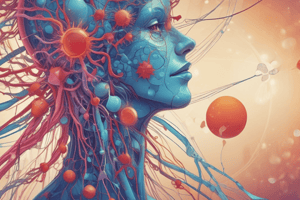Podcast
Questions and Answers
What is the main cause of autoimmune diseases?
What is the main cause of autoimmune diseases?
- Overproduction of B cells
- Deficiency of T cells
- Decreased antibody production
- Failure of self-tolerance mechanisms (correct)
Which of the following is an example of an autoimmune disease?
Which of the following is an example of an autoimmune disease?
- Psoriasis
- Asthma
- Influenza
- Rheumatoid arthritis (correct)
What is the main effect of human immunodeficiency virus (HIV) on helper T cell count?
What is the main effect of human immunodeficiency virus (HIV) on helper T cell count?
- It has no effect on helper T cell count
- It increases helper T cell count
- It causes abnormal proliferation of helper T cells
- It decreases helper T cell count (correct)
How is acquired immunodeficiency syndrome (AIDS) primarily transmitted?
How is acquired immunodeficiency syndrome (AIDS) primarily transmitted?
What are the three principal things that can go wrong with immune function?
What are the three principal things that can go wrong with immune function?
What is the specific cause of severe combined immunodeficiency disease (SCID)?
What is the specific cause of severe combined immunodeficiency disease (SCID)?
What are the four types of hypersensitivity reactions, and what are their characteristics?
What are the four types of hypersensitivity reactions, and what are their characteristics?
What are the diseases to which a person with acquired immunodeficiency syndrome (AIDS) becomes more susceptible?
What are the diseases to which a person with acquired immunodeficiency syndrome (AIDS) becomes more susceptible?
What is the main mode of action of the human immunodeficiency virus (HIV)?
What is the main mode of action of the human immunodeficiency virus (HIV)?
What normally prevents the occurrence of autoimmune diseases?
What normally prevents the occurrence of autoimmune diseases?
Which of the following best describes the pathology of acquired immunodeficiency syndrome (AIDS)?
Which of the following best describes the pathology of acquired immunodeficiency syndrome (AIDS)?
What is the main cause of hypersensitivity reactions?
What is the main cause of hypersensitivity reactions?
What is the specific cause of severe combined immunodeficiency disease (SCID)?
What is the specific cause of severe combined immunodeficiency disease (SCID)?
Which of the following best describes the mode of action of human immunodeficiency virus (HIV)?
Which of the following best describes the mode of action of human immunodeficiency virus (HIV)?
What is the main effect of hypersensitivity type I reaction on the body?
What is the main effect of hypersensitivity type I reaction on the body?
What is the primary cause of autoimmune diseases?
What is the primary cause of autoimmune diseases?
What is the role of MHC-II proteins in the response of an immunocompetent B cell to a foreign antigen?
What is the role of MHC-II proteins in the response of an immunocompetent B cell to a foreign antigen?
What distinguishes a plasma cell from a B cell?
What distinguishes a plasma cell from a B cell?
How do antibodies combat antigens by opsonization?
How do antibodies combat antigens by opsonization?
What is the role of MHC-II proteins in the response of an immunocompetent B cell to a foreign antigen?
What is the role of MHC-II proteins in the response of an immunocompetent B cell to a foreign antigen?
What is the main difference between a plasma cell and a B cell?
What is the main difference between a plasma cell and a B cell?
How do antibodies combat antigens by opsonization?
How do antibodies combat antigens by opsonization?
How do antibodies combat antigens through neutralization?
How do antibodies combat antigens through neutralization?
What is the main role of a TH cell in the response of an immunocompetent B cell to a foreign antigen?
What is the main role of a TH cell in the response of an immunocompetent B cell to a foreign antigen?
What distinguishes a plasma cell from a memory B cell?
What distinguishes a plasma cell from a memory B cell?
What is the function of an antigen-presenting cell (APC) when it detects a foreign antigen?
What is the function of an antigen-presenting cell (APC) when it detects a foreign antigen?
What are the functional differences between MHC-I and MHC-II proteins?
What are the functional differences between MHC-I and MHC-II proteins?
What is the main role of activated TH cells in cellular immunity?
What is the main role of activated TH cells in cellular immunity?
What are the characteristics of immune memory in cellular immunity?
What are the characteristics of immune memory in cellular immunity?
What are the three fundamental stages of cellular immunity?
What are the three fundamental stages of cellular immunity?
How do activated TH cells stimulate neutrophils, NK cells, and macrophages in cellular immunity?
How do activated TH cells stimulate neutrophils, NK cells, and macrophages in cellular immunity?
What is the role of MHC-I proteins in cellular immunity?
What is the role of MHC-I proteins in cellular immunity?
What are the characteristics of immune memory in cellular immunity?
What are the characteristics of immune memory in cellular immunity?
What is the main function of antigen-presenting cells (APCs) in cellular immunity?
What is the main function of antigen-presenting cells (APCs) in cellular immunity?
What is the primary function of activated cytotoxic T (TC) cells in cellular immunity?
What is the primary function of activated cytotoxic T (TC) cells in cellular immunity?
What is the significance of MHC restriction in cellular immunity?
What is the significance of MHC restriction in cellular immunity?
What is the role of activated helper T (TH) cells in cellular immunity?
What is the role of activated helper T (TH) cells in cellular immunity?
What are the three fundamental stages of cellular immunity?
What are the three fundamental stages of cellular immunity?
How do activated cytotoxic T (TC) cells destroy target cells in cellular immunity?
How do activated cytotoxic T (TC) cells destroy target cells in cellular immunity?
What is the role of antigen-presenting cells (APCs) when they detect a foreign antigen?
What is the role of antigen-presenting cells (APCs) when they detect a foreign antigen?
What is the functional difference between MHC-I and MHC-II proteins in cellular immunity?
What is the functional difference between MHC-I and MHC-II proteins in cellular immunity?
Flashcards are hidden until you start studying




